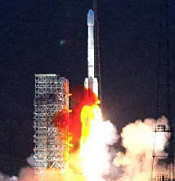
ABOVE: Chinese Long March 3B
rocket blasts off on July 6, 2007
As the end of the year approaches, the Bureau of Industry and Security (“BIS”) has been busy releasing a flurry of settlement agreements for export violations. In the latest batch is a settlement agreement by Interpoint Corporation, a subsidiary of Washington-based Crane Aerospace and Electronics.
Crane agreed to pay BIS a $200,000 fine to settle charges that it engaged in 37 illegal exports of EAR99 items to China. In two instances, the exports were destined for the 13th Institute, an end-user in China on BIS’s Entity List. The remaining exports were alleged to violate section 744.3 of the Export Administration Regulation (“EAR”) because Interpoint had been informed that the items would be for use “in the PRC’s Long March [Chang Zheng] rocket program or in other commercial rocket programs.”
Section 744.3(a)(1) requires a license for any export to a country in Country Group D:4, which includes China, if the exporter knows that the item will be used for commercial (or other) rocket systems with a range in excess of 300 kilometers. The Chinese Long March rockets are designed to carry satellites into geosynchronous orbit, i.e. 35,786 kilometers above sea level on the Earth’s surface.
In instances in which the items weren’t destined for the Long March rockets, Interpoint knew that they were destined for other “commercial rocket programs,” although there is no allegation that Interpoint knew which rocket programs or that the rockets had ranges in excess of 300 kilometers. These exports were probably covered by section 744.3(a)(3), which requires a license for exports used in rocket systems by a country in group D:4 if the exporter is “unable to determine … [t]he characteristics (i.e., range capabilities) of the rocket systems.”
Although section 744.3(a) clearly embodies a knowledge requirement, the scope of that knowledge requirement is unclear, and the Settlement Agreement casts little light on this confusing issue. Was Interpoint required to know that the items were for use in the Long March rocket program and to know that the Long March rockets had a range in excess of 300 kilometers? Or was it enough that Interpoint knew that the items were destined for Long March rockets which, whether Interpoint knew it or not, had a range far in excess of 300 kilometers?
Section 744.3(a)(3) appears to answer part of this question by imposing a duty to investigate the range of the rocket: an export to a D:4 country requires a license if the exporter is unable to determine the range of the rocket. But that still doesn’t answer a more intransigent case. Suppose that the exporter is told falsely that the rocket is only designed to carry a payload to a Low Earth Orbit less than 300 kilometers? Of course, an exporter can avoid having to put itself in the uncomfortable position of answering that question by simply refusing to export parts without a license to a D:4 country if that part is to be used for a rocket of any range.
 Permalink
Permalink
Copyright © 2008 Clif Burns. All Rights Reserved.
(No republication, syndication or use permitted without my consent.)

 Posted by
Posted by  Category:
Category: 

